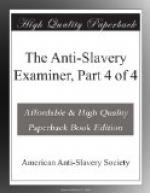* * * * *
From that day (1830), SLAVERY, SLAVEHOLDING, SLAVE-BREEDING AND SLAVE-TRADING, HAVE FORMED THE WHOLE FOUNDATION OF THE POLICY OF THE FEDERAL GOVERNMENT, and of the slaveholding States, at home and abroad; and at the very time when a new census has exhibited a large increase upon the superior numbers of the free States, it has presented the portentous evidence of increased influence and ascendancy of the slaveholding power.
Of the prevalence of that power, you have had continual and conclusive evidence in the suppression for the space of ten years of the right of petition, guarantied, if there could be a guarantee against slavery, by the first article amendatory of the Constitution.
No. 13.
THE
ANTI-SLAVERY EXAMINER.
* * * * *
ON THE CONDITION OF THE FREE PEOPLE OF COLOR
IN THE UNITED STATES.
* * * * *
NEW YORK:
PUBLISHED BY THE AMERICAN ANTI-SLAVERY SOCIETY,
NO. 143 NASSAU STREET.
1839.
* * * * *
This No. contains 1-1/2 sheet.—Postage, under 100 miles, 2-1/2 cts. over 100, 3 cts.
Please Read and circulate.
ON THE CONDITION OF THE FREE PEOPLE OF COLOR.
* * * * *
It appears from the census of 1830, that there were then 319,467 free colored persons in the United States. At the present time the number cannot be less than 360,000. Fifteen States of the Federal Union have each a smaller population than this aggregate. Hence if the whole mass of human beings inhabiting Connecticut, or New Jersey, or any other of these fifteen States, were subjected to the ignorance, and degradation, and persecution and terror we are about to describe, as the lot of this much injured people, the amount of suffering would still be numerically less than that inflicted by a professedly Christian and republican community upon the free negroes. Candor, however, compels us to admit that, deplorable as is their condition, it is still not so wretched as Colonizationists and slaveholders, for obvious reasons, are fond of representing it. It is not true that free negroes are “more vicious and miserable than slaves can be,"[97] nor that “it would be as humane to throw slaves from the decks of the middle passage, as to set them free in this country,"[98] nor that “a sudden and universal emancipation without colonization, would be a greater CURSE to the slaves themselves, than the bondage in which they are held.”
[Footnote 97: Rev. Mr. Bacon, of New Haven, 7 Rep. Am. Col. Soc. p. 99.]
[Footnote 98: African Repository, Vol. IV. p. 226.]
It is a little singular, that in utter despite of these rash assertions slaveholders and colonizationists unite in assuring us, that the slaves are rendered discontented by witnessing the freedom of their colored brethren; and hence we are urged to assist in banishing to Africa these sable and dangerous mementoes of liberty.




